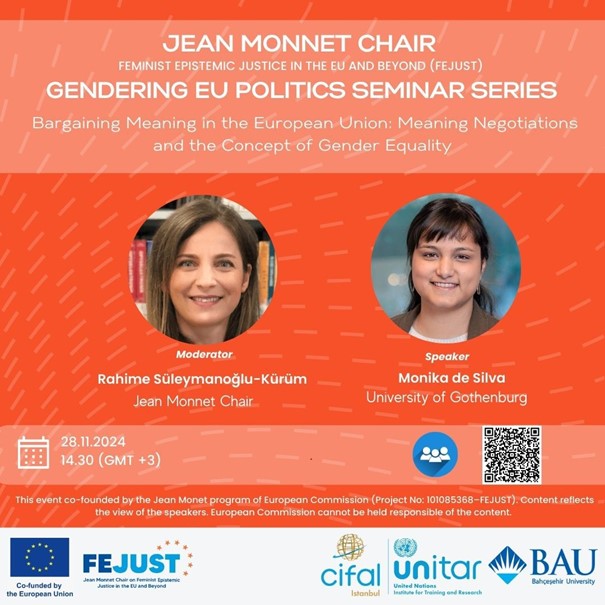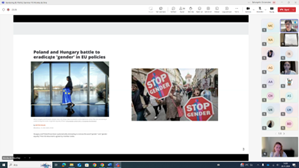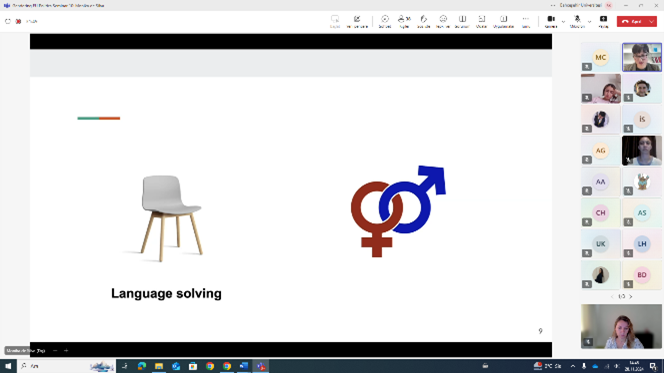Gendering EU Politics Seminar 9
Title: Bargaining Meaning in the European Union: Meaning Negotiations and the Concept of Gender Equality
Date: 28 November 2024
Speaker: Monika de Silva (University of Gothenburg)
Moderator: Rahime Süleymanoğlu-Kürüm, Jean Monnet Chair, BAU

The 9th seminar in the Gendering EU Politics series welcomed Monika de Silva, a Ph.D. candidate in Political Science at the University of Gothenburg, who delivered a thought-provoking presentation titled “Negotiating the Meaning of Gender Equality in the EU.” The event was attended by 40 participants, including academics and early career researchers from various universities across Turkey, as well as policymakers and representatives from civil society organizations. The diverse audience facilitated a vibrant and interdisciplinary exchange of ideas, reinforcing the seminar's role as a platform for impactful dialogue.
About the Speaker
Monika de Silva specializes in international relations and European studies, with a focus on polarization over gender and sexuality norms in international society. Her dissertation investigates interactions between conservative and progressive states, analyzing bilateral embassy activities in Poland and negotiations within the Council of the EU. She holds an advanced MA in EU International Relations and Diplomacy from the College of Europe (2020) and a Master of Law from the University of Warsaw (2019). Her professional experience includes traineeships at the European External Action Service, the Council of Europe, and the Polish Ministry of Foreign Affairs, equipping her with deep insights into the EU’s institutional workings.
Presentation Overview
In her presentation, Monika de Silva offered an innovative framework to analyze the negotiation of gender equality in the EU. She introduced two distinct modes of negotiation: language solving and language bargaining. Language solving, she explained, involves cooperative discussions focused on achieving shared meanings and consensus, while language bargaining reflects a contentious process characterized by competing national discourses and minimal compromise.
Drawing from her fieldwork and interviews with EU negotiators, de Silva highlighted how member states’ cultural and linguistic differences shape the negotiation process. For instance, countries like Poland and Hungary have contested the inclusion of the term “gender” in EU documents, associating it with progressive ideologies they oppose. She traced the evolution of the term “gender equality” in EU discourse, noting its introduction in the late 1990s and the varying interpretations it has garnered over time. One striking example was her analysis of how the term "gender equality" is ambiguously defined to accommodate diverse member states’ sensitivities, a practice that has led to both consensus and contention.
De Silva also discussed the broader political and cultural implications of these negotiations, particularly in the context of anti-gender movements and the rise of right-wing populism in Central and Eastern Europe. She argued that while ambiguous definitions often allow the EU to maintain a facade of consensus, they undermine the clarity and legitimacy of gender-related policies. Her framework bridges gaps in existing literature by highlighting the interplay between national discourses and EU-level policy, offering a fresh perspective on how linguistic nuances impact political outcomes.
This seminar holds particular importance for advancing feminist epistemic justice by critiquing the technocratic and androcentric approaches that often dominate EU policymaking. De Silva’s work emphasizes the need for inclusive, interdisciplinary approaches that incorporate feminist expertise and challenge hegemonic discourses. By exposing how national discourses shape and sometimes undermine EU gender norms, her research advocates for a more equitable and participatory process in defining gender-related policies. This aligns with the seminar series' mission to decolonize knowledge production and amplify underrepresented voices in European studies.
The seminar fostered an engaging Q&A session, where participants explored topics such as the role of right-wing governments in shaping EU gender discourse, the implications of linguistic diversity for EU policymaking, and the challenges of promoting gender equality in external relations. Attendees also discussed how the lack of a universal definition of “gender equality” influences the EU’s external policies and its normative promotion of gender equality in international agreements.
De Silva’s research was praised for addressing a critical gap in the literature and for providing a nuanced understanding of the EU’s policymaking dynamics. Participants commended the innovative framework of “language solving” and “language bargaining” as a valuable tool for analyzing contested political concepts.
The event underscored the significance of addressing the intersection of language, culture, and politics in shaping EU policies on gender equality. It highlighted the importance of feminist epistemic interventions in ensuring that policymaking processes are inclusive and reflective of diverse perspectives. The insights shared by Monika de Silva not only enriched the academic discourse on gender and EU politics but also provided practical recommendations for fostering more effective and equitable policy negotiations.
This seminar exemplified the value of the Gendering EU Politics series as a space for critical engagement with pressing issues in European integration and feminist theory. We are glad to see that de Silva’s article is published in the Journal of European Public Policy after the presentation hosted by FEJUST.

